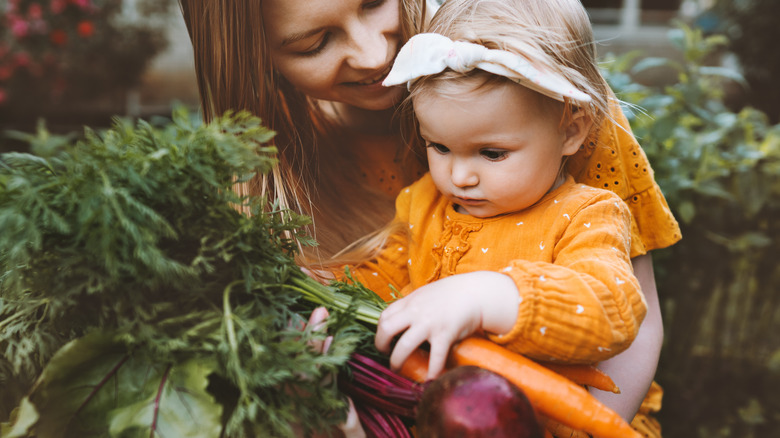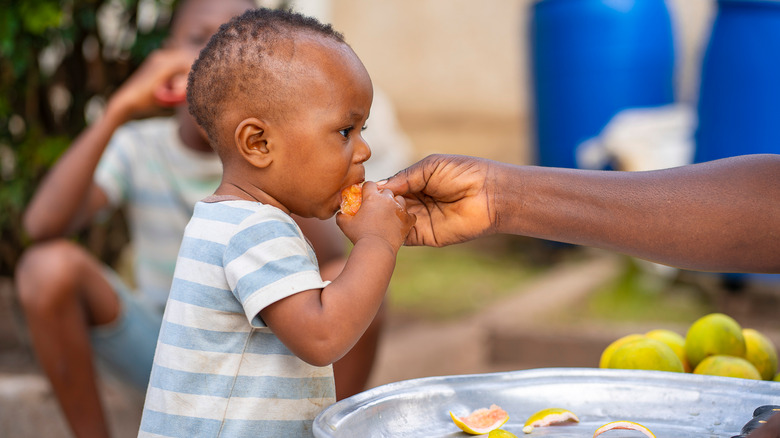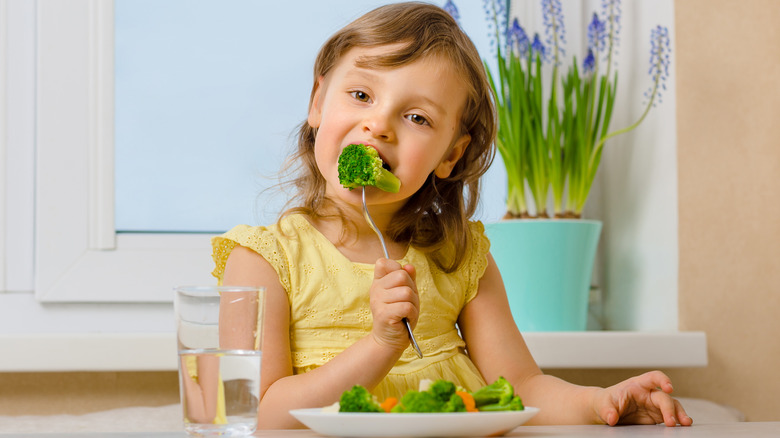Is It Safe For Kids To Be Vegan?
Although veganism has been accepted into society, people may still look askance at those who are dedicated to raising their little ones to be vegan. If you're considering feeding your child a vegan diet, you may wonder if it's healthy for them — after all, kids need a variety of nutrients to grow and develop, and some of those are found mainly in animal-based foods. Babies especially require the right amount of proteins and vitamins for rapid growth and brain development.
Be assured, for most healthy kids, it's absolutely okay never to eat animal and dairy products. "In general, it's safe and healthy to offer a plant-based diet," pediatric dietitian Amy Chow told Healthline. Many other experts have independently concluded that vegan diets can be safe for infants and children "without compromise of nutrition or growth," according to an article published in Pediatrics in Review. But before your children follow in your vegan footsteps, consider these important guidelines so you don't shortchange them of the nutrients they need for growth and development.
Is a vegan diet safe for infants?
The best food for newborns is also vegan. Although technically animal-based, breast milk comes from humans for humans, so it can be given to your baby without any ethical, environmental, or dietary concerns. A vegan nursing mother needs to be sure, however, she's eating enough protein for her baby and herself.
Babies require "more protein proportional to their body weight" than adults, as protein is necessary for their growth (per Medical News Today). The recommended amount is 71 grams of protein daily for nursing women. Also, as a vegan, you may have a limited amount of vitamin B12, which is found in animal products, to pass on to your newborn. B12 is essential for an infant's neurological development, so it's wise to take a B12 supplement, according to the Centers for Disease Control and Prevention.
Non-dairy formulas are available if you are unable or do not wish to breastfeed. However, they're not completely vegan. The reason, according to Vegans First: The Food and Drug Administration (FDA) requires that formulas for babies up to 12 months of age contain vitamin D. Many brands include synthetic D3, which is usually, but not always, derived from an animal source. While not entirely vegan, such formulas are the next best thing, as they go as far as possible to avoid animal sources while still adhering to FDA requirements.
Vegan diets for toddlers
After six months of age, when the Academy of Pediatrics recommends starting solid foods, a mini vegan's diet needs to be carefully planned so they get all their necessary nutrients. For instance, between the ages of seven and 12 months, a baby's need for iron is at its highest, due to rapid growth. To meet that need on a vegan diet, offer mashed beans, iron-fortified cereal, and dried fruits. Plant-based proteins such as beans, peas, tofu, and lentils can substitute for animal proteins. Adequate fat, which supports the growth of the body and brain, is important too. Provide healthy sources of fat, like vegetable oil, avocado, and nut butters. Go easy on the vegan milk alternatives, such as almond, coconut, and rice — they will fill up a toddler's tummy without giving her enough protein or nutrition (via Healthline).
Other nutrients are present in low amounts in plant foods, including B12, iodine, calcium, and DHA omega-3 fatty acids. Fortified cereals and soy milk are B12-enriched, while tofu, almond and sesame butters, and leafy greens are calcium-rich. Iodine may have to be given as a supplement in early childhood because much of dietary iodine comes from salt. Likewise, DHA omega-3 fatty acids may need to be provided as a supplement because these fatty acids are primarily in animal products.
The benefits of a vegan diet in childhood
Providing your child with a vegan diet may require a bit of work, but so does offering a non-vegan diet. Kids can be picky no matter what they're fed. However, you may find it worth the effort to raise your child vegan because it provides benefits that an animal-based diet doesn't. One such benefit is the absence of fast and convenience foods, which are high in refined carbs and saturated fats and lead to weight gain and other health problems (via Parade).
Vegan children are also exposed to a wider variety of foods early on, which encourages them to experiment so their palate expands and they eat a broader array of foods even later on as an adult. Finally, vegan families tend to have a greater understanding of and appreciation for what they're eating — and not eating. A vegan diet also sometimes incorporates philosophical decisions when making food choices, Paul Chek with the C.H.E.K. Institute, a holistic fitness program designed for fitness professionals, told Parade.




